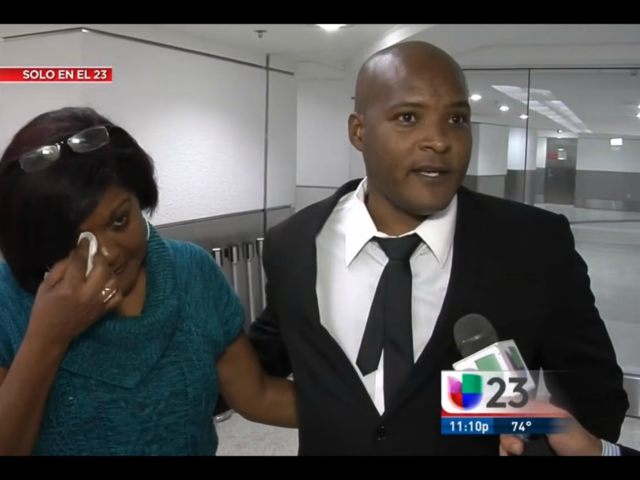Cuban doctor Yoahn Batista succeeded on his second try to escape the oppression of the Castro communist regime, fleeing a mission in Brazil and arriving in the United States this week. Among the first words spoke upon landing in Miami, Batista tells the world, “They are using us as slaves. That is the reality.”
Local Miami affiliate Univisión 23 caught the moment Batista reunited with his mother at the airport, whom he had not seen for 22 years. His mother fled to the United States with her two younger daughters, unable to take Batista with her because he had already begun medical school training. He describes how he first tried to escape a mission in socialist Venezuela to travel north but failed. “Since I am a doctor, I had to escape without them noticing that I was going to desert the mission,” he tells reporter Yusnaby Pérez. “They impose a lot of political pressure on us.”
Batista finally managed to book himself on a mission to Brazil and defect, arriving in America this week. Among his first free words on U.S. soil: “Cuba is selling the world an image that is not how it is.”
“They are using us as slaves, that’s the reality. We are slaves,” he tells Pérez. “Slaves in lab coats.”
Batista insists he would never return to Cuba “with that government,” even if President Obama restores free travel to Cuba. There is no evidence Raúl Castro would expand freedom of travel even if President Obama does. On the contrary, the Castro regime imposed new restrictions on doctors traveling abroad following President Obama’s concessions to the regime, including removing the Hezbollah- and FARC-tied government from the nation’s State Sponsors of Terrorism list.
In addition to restricting travel for doctors, the Cuban government following President Obama’s “normalization” announcement has increased its rate of politically-motivated arrests and violence against dissidents. “There has been no substantial improvement in regard to human rights and individual freedoms on the island… [The Cuban government] has adapted its repressive methods in order to make them invisible to the scrutinizing, judgmental eyes of the international community, but it has not reduced the level of pressure or control over the opposition,” the Czech NGO People in Need reported in December.
This appears to be by design. “Cuba will do absolutely nothing, will not move one millimeter its position to try to respond to people that are not looking out for our nation’s best interests,” Cuban diplomat Josefina Vidal said in response to questions about human rights violations on the island in August.
Batista’s comparison of Cuba’s doctor exporting industry to “slavery” is neither new nor ill-founded. For years, similar testimonies out of those who have defected have surfaced. In October 2015, a doctor who defected to Chile recounted his experience working for the communist government to the PanAmerican Post. “Many of us would wake up around midnight from hunger pains, and no one ever gave us anything; maybe a slice of bread, at the most,” he said, asserting that he could not afford “an egg a day” to feed himself on his medical salary. He defected because “If you are starving in your own country, and they [the regime] are having a laugh at your expense — with low wages, no chance for a raise, and unpaid shifts — what are you going to do?”
After years of international pressure to treat its doctors better, but before President Obama’s speech sanctioning interaction with the Castro regime, Cuba finally gave its doctors a raise: from $25 a month to $64 a month. At the time, Cuba was making $8.2 million a year on exporting doctors to friendly countries, with 50,000 Cuban medical workers employed in 66 nations worldwide.
By the end of the year, the estimate of the amount Castro was making on Cuba’s doctors was reduced to $7.6 million, still about two million more than Cuba made that year in exporting goods. While doctors working domestically could count on $64 a month, there is no evidence those abroad are being paid at all, instead expected to survive on an unspecified “living stipend.”
Doctors deployed to west Africa in 2014 to fight the Ebola outbreak there, for example, protested a year later that they had not been paid at all, even though the World Health Organization had promised them $8,000-$10,000 a month for risking their lives with Ebola exposure. Should they complete their missions in good health, the doctors were also promised cars and homes they never received.
The small reported dent in income for the Castro regime appears to be the product of doctors like Batista defecting, thanks in large part to the United States’ policy of welcoming Cuban doctors and affording them educational benefits to receive licensing in America. Laws protecting Cuba’s slave doctors have repeatedly come under fire from the pro-Castro publication the New York Times, and has been successful enough to prompt the Castro government to further restrict travel for doctors.

COMMENTS
Please let us know if you're having issues with commenting.